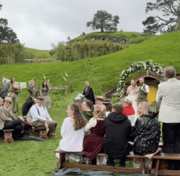Experts offer explanation over an Australian dentist’s bizarre experience after she developed an Irish accent after surgery
By
- Replies 0
We’ve all had a surgery or two in our lives, but for one dentist, a routine tonsillectomy led to a very surprising – and extremely rare – condition.
Angie Yen, who was born in Taiwan and moved to Australia aged eight, woke up ten days after her operation with what sounded like an Irish accent.
"My accent hasn’t completely reverted back to its Australian twang," she told 7Life.com.au.
Apparently, Angie is suffering from a condition known as foreign accent syndrome.
The condition can be triggered by a damage to the brain and is extremely rare, with only around 60 documented cases worldwide.
Credit: TikTok/@angie.mcyen
Angie said that she had been living with the new accent since her operation in April 2021.
She shared: “I still have a light American and Northern Irish lilt. It gets thicker when I’m stressed, tired or run down."
“I still struggle to pronounce words sometimes in my professional life as a dentist - embarrassing at times, people struggle to understand what I’m saying and I get frustrated being asked to repeat myself."
“I still sound different and some days with a thicker accent.”
The Brisbane dentist also shared her struggles with everyday life since developing the foreign accent over 12 months ago.
Angie said: “The speech issues were temporary struggles that got better with time but the long-term challenge is accepting my new accent, voice and identity.”
“Initially I was jumbling, stuttering my words, and now I still miss syllables when I am talking."
“For example - a word I still struggle to say is ‘exclusively’, I would somehow say ‘elusively’ but knowing that I meant exclusively."
“It’s bizarre as I never had speech issues despite English being my second language and I grew up here in Australia.”
Angie said that her condition was triggered by her tonsillectomy. Credit: Angie Yen.
She said that the first sign that made her realise that her voice sounded strange was when she was singing in the shower just hours after she had a job interview on April 28, 2021.
Angie told 7Life.com.au: “I was very worried and freaking out.”
“I felt like I was waking up in someone’s body but it was my face I was seeing in the mirror. I was very confused.”
The dentist said that she started panicking when one of her friends sent her a link to a YouTube video, showing a British woman waking up one day with an "Asian-sounding accent".
“I had no idea this could happen overnight to people and learned that it was most commonly caused by neurological triggers such as from stroke, seizures and migraines,” she quipped.
“I was so worried that I was going to have a stroke but I didn’t have any of the typical signs.”
She also revealed that an emergency doctor at a private hospital sent her home after she talked about her condition, sharing that she was advised to phone an ear, nose, and throat specialist since she had her tonsils taken out 10 days prior to the consultation.
“I was dismissed, laughed at, mocked but got no answers as to why I sounded like this. It was so crazy and bizarre,” she said.
The dentist has come to terms with the fact that her condition has no cure. Credit: Angie Yen.
Angie then realised that her condition “wasn’t going to go away anytime soon”.
She said: “When I woke up days later still not speaking like my old self, the novelty wore off.”
“I had no idea how sounding different could change someone’s life for the worst.”
The dentist said that aside from the accent change, she's also suffering from speech issues like stuttering and word jumbling.
Additionally, Angie said that no doctor has given her any explanation regarding her condition.
“It’s a poorly documented condition with no cure,” she said.
The lack of proper documentation on her rare condition prompted her to record her struggles and share it on social media to raise awareness for the syndrome.
“After going viral, I had people from all over the world reach out to me saying how they were glad they finally found another person who has this isolating and rare condition and they felt validated.”
“I ended up getting answers a lot quicker and found scientific proof that I wasn’t faking this for clout and attention, which a lot of people claimed.”
“I am paying the favour forward by spreading awareness about this rare condition.”
Angie expressed her hopes that anyone who wakes up with a "funny accent" would be given medical attention instead of being ridiculed.
The Aussie dentist's story has grabbed the attention of scientist Karl Kruszelnicki who offered an explanation on the condition.
Credit: TikTok/@angie.mcyen
He said: “Waking up to find yourself speaking in a foreign accent like Ange can be very distressing because your speech partly defines who you are.”
“It’s unnerving to suddenly lose control of one’s voice and to be locked into a single speech modality."
“It is usually caused by a brain disorder. This can be from a head injury, stroke or surgery."
“But it can be related to diabetes, immune disorders or other unknown causes."
“To speak clearly requires incredibly precise control by your brain of your lungs, larynx, tongue, lips, jaw and mouth.”
Apparently, the "accent" is not real and is a "damaged form of the person’s native language and accent” instead.
Dr Karl also revealed that the speech issues can be fixed.
“Just like you can get physio for a sports injury, this can be done through speech training, usually from an acting school,” the expert said.
Meanwhile, Macquarie University Department of Cognitive Science professor Lyndsey Nickels confirmed the rarity of Angie's case, describing it as "certainly unusual" given the delay of its emergence after surgery.
“When you listen to her speak in her TikTok videos, not every word she speaks is pronounced as if she were from Ireland – there is a lot of variability,” the professor said.
“Some sounds will be mispronounced in a way that sounds - in Angie’s case, ‘Irish’ - but other sounds will be mispronounced in a way that does not fit with that accent.
“Because of the problems with coordinating the speech muscles, sometimes they might ‘undershoot’ their target, and sometimes ‘overshoot’, depending on which happens the sounds will come out slightly differently.
“So sometimes the sounds will seem ‘Irish’ but other times not.”
We believe that raising awareness on this medical condition could shed light on other rare diseases and foster inclusivity and understanding.
How about you? What are your thoughts on this?







